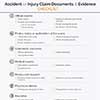
These tips can help you search for and evaluate lawyers in your area to find the one who’s right for your case
There are more than 24,000 lawyers in North Carolina.
So how do you select the one who will be best for handling your lawsuit?
If you’re in the process of recovering from an injury, you probably want to find an expert who’s going to handle everything quickly and get you the money you need to pay your bills and keep your lifestyle intact.
But you don’t want to jump into it without a plan.
And here’s another important fact:
If your accident was serious or newsworthy, it’s possible that a lawyer could contact you in the hospital or at home. But that’s not allowed. You might have heard of personal injury lawyers referred to as “ambulance chasers,” but in actuality this behavior isn’t permitted. If a lawyer disobeys ethics rules by reaching out to you after an accident without your knowledge or permission, that’s your first clue that it’s probably not someone you should work with.
Just like doctors, lawyers don’t all work the same way. For example, if you need ankle surgery, you wouldn’t visit an obstetrician. Lawyers are specialists, too. If your claim is a personal injury, you need a personal injury lawyer — not someone who handles criminal defense, bankruptcy, or family law.
Within personal injury (or tort law), there are specialties, too. If your injury is related to a car accident, truck accident, slip-and-fall, defective product, medical malpractice, construction accident, or something else, you’ll want to find a lawyer with demonstrated expertise in that area of law.
Here are 4 simple steps you can follow for finding a North Carolina lawyer who is the right fit for you:
Step 1: Use your available resources to begin a search
Word of mouth
Every person has access to different resources. People can be your best resources. If you have friends, neighbors, family members, or coworkers who have used the services of a personal injury lawyer, tap into their knowledge and experience.
Start by considering recommendations from your personal network. Their experiences can provide insights into a lawyer’s reputation, style, and ability to handle a lawsuit. A lawyer who’s well-respected in the community — especially by other lawyers and judges — will likely have advantages within the court system and when negotiating settlements.
Social networks
You can also use your online social networks but tread carefully.
Anything you share online can later be introduced into your lawsuit. Even if you think you’re only sharing with your friends, or if you later delete a post or photo, there are ways for investigators and insurance companies to uncover any online evidence that can be detrimental to your claim.
Here’s an example:
Let’s say you’re injured after a slip-and-fall in a shopping mall because the floor was wet on a wintry day. You believe mall management should’ve known that the floor would be wet because of the weather conditions and was negligent in failing to clean the floor or place warning signs in the area.
That night, you head to Facebook and write, “Had an ‘oopsie’ at Main Street Mall today and fell pretty hard on my behind! Mad that they didn’t keep the floor dry, but I’ll be fine! 🤕”
Understandably, your friends are concerned. So, a few days later, you decide to create a follow-up post: “Still recovering from when I fell in the mall. My hip still kind of hurts, but definitely moving around more now and getting better each day.”
However, in your claim against the mall management, you said that you were in excruciating pain and unable to work for many months after the accident. At a deposition, your credibility is damaged because your claim makes it sound like your injury is very severe but your Facebook posts seem like it’s not more than a temporary bruise.
Instead of providing all the details about your accident and resulting condition, you might simply post, “I’m looking for a personal injury lawyer who specializes in slip-and-fall accidents. Can you recommend someone?”
If your friends react and ask what happened, you can take the conversation offline. If you want to share details, talk with friends on the phone or in person, but avoid putting that information out on a social network.
This way, it protects the evidence and your claim so that your lawyer controls how it’s presented to the defense, and not well-meaning social media posts.
Online local networking apps
There are also ways to get recommendations from people in your community without asking directly.
Networking apps like Nextdoor and Angie’s List are designed to connect people with service providers in their local areas. You can search for the type of service, read reviews from other users, and see if the provider’s specialties match your needs.
Still, be wary as these sites are supported by paid advertising. What looks like a recommendation could be a paid advertisement. These sites can be a good way to gather a list of lawyers in your area, but you still have to do your research.
You can also check with your local Chamber of Commerce for a listing of local lawyers.
Online legal directories
A site like Nextdoor offers resources for all kinds of services — everything from landscaping to hair salons.
If you’re looking for a lawyer, you might want to narrow down your search parameters a little more specifically. A trusted and authoritative legal site like the Enjuris Law Firm Directory can effectively narrow your search by both geography and specialty. So, if you’re looking for a lawyer for a motorcycle accident, premises liability claim, medical malpractice, birth injury, or any other tort law issue, you can quickly find someone who will have the right expertise to handle your claim.
There are also state legal directories that can be helpful for vetting your prospects. The North Carolina State Bar website allows you to check a lawyer’s disciplinary record and ensure they have an active North Carolina law license.
The State Bar website can also help you find low-cost assistance for some kinds of legal issues like family law matters and civil rights violations. If you need criminal defense and can’t afford it, the court will appoint a public defender.
Step 2: Narrow it down
Once you have a set of prospects, the next task is to narrow it down to a “shortlist” of 2 or 3 attorneys who you’ll want to meet with in person.
Almost every lawyer or firm has a website that lists specifics about either the firm’s or the members’ qualifications, including:
- Education and years of experience
- Courts where they’re admitted to practice
- Specialties
- Honors and awards
- Boards, nonprofits, and other activities in which the lawyers participate
Read the lawyers’ bios to get a feel for who they are and what they’re passionate about. In larger firms, you’ll often have a team of lawyers working on your case, and you might have the majority of your communication with paralegals, legal assistants, or associate (junior) lawyers.
Your personal style will help determine which firm would be most comfortable for you. If you want to primarily work with one person, develop a relationship, and possibly receive more one-on-one attention, a small firm might be your best bet. A larger firm might demonstrate more “muscle” to the defendant and be more well-known within the court system, which could have advantages, but you’re less likely to have much facetime with your lawyer and will usually talk with assistants instead.
Most personal injury lawyers offer a free consultation appointment. It’s fine if you need to visit more than one law firm before you decide who you’d like to represent you.
Step 3: Prepare for a consultation
These steps can help you prepare for your consultation with a personal injury lawyer.
There are two sides to a consultation appointment:
You’re “interviewing” the lawyer to see if you want to hire them, and they’re evaluating your case to see if they can represent you successfully.
You want to see certain things from them, and they want information from you. The best thing you can do is to make the process efficient. The lawyer is likely very busy and has a set amount of time allotted for your appointment.
Here’s what you need to know as you go to a consultation:
- The lawyer should make you feel comfortable. Depending on your injury, there might be intimate details of your physical or emotional condition that are important to your case.
- Your lawyer should listen. Although they’re busy, they also shouldn’t make you feel rushed or like they don’t have the time to really handle your case attentively. Ask who you’ll talk with when you call the office — if it’s going to be an assistant or if you’ll be able to contact the lawyer directly. Ask if they have a general practice for responding to phone calls or email (if they respond within a day, week, etc.).
- Ask if they have the time and capacity to handle your case.
- Ask what experience they have with your type of case.
- Ask how many cases settle out of court, and how many go to trial.
- Ask if they’re connected with expert witnesses who will be available and reliable to testify in your case.
- Ask about their typical negotiation strategy for settling claims like yours.
- Medical information, including records that detail diagnoses and treatments
- Medical bills (including those that were already paid by you or by your insurance company)
- Documents that detail what your future medical needs are
- Any related services you received (ambulance transport, hospital, etc.) with names and addresses for each
- Dates of treatment (including hospital admissions and release dates)
- List of current medications and any prescribed medications you were taking as a result of the injury
- Copy of your relevant insurance policies (medical, auto, homeowners, or other)
- Documentation of lost wages and proof of salary or income
- Police reports or other documents like witness statements or photos related to the accident (or cause of injury)
Have two copies of each document. Be prepared to give the lawyer one complete set and keep a set for yourself.
These worksheets can help you prepare for your consultation.

Worksheet with questions to ask a personal injury attorney to help determine if he or she will be a good fit for your case
Download in PDF format

Checklist of 30 items to help you prepare for making a personal injury or accident claim
Download in PDF format
You can also get clues about the lawyer by looking around the firm’s offices. Sometimes the intangibles are very telling.
- Does the staff look harried or disorganized?
- Is the office professional looking and neat?
- How were you greeted when you arrived?
If the staff is friendly, you were greeted warmly, the lawyer seemed prepared for your visit, and the office seems organized and well-run, those are all positive indicators.
Step 4: Negotiating attorney fees
Once you’ve found the person who you feel most confident in representing you, you will sign the first legal document related to the case: the retainer contract.
The retainer sets forth the terms of the representation such as that you’re being represented for and how much it will cost. Read this document carefully before you sign and ask questions about the terms.
Most personal injury lawyers work on a contingency fee basis, which means you only pay if and when you receive a damage award or settlement. There might be some fees you pay upfront, such as hiring experts or travel, or if there are other expenses related to the discovery process or additional aspects to your case.
Many lawyers will be paid around 33% of what you receive in damages or settlement. Some lawyers’ retainers provide for an additional percentage if the case goes to trial because that process takes more time and effort than negotiating a settlement. Some lawyers will negotiate their rates based on the complexity of the case.
Should you “lawyer-shop” for the lowest rates? Not necessarily. Often, law firms of comparable size in the same geographic region are competitive on rates. If one is exceptionally high or exceptionally low, that’s something to look into before you sign a retainer.
Enjuris offers a variety of resources to help you find the personal injury lawyer who’s best suited to you and your lawsuit:
- North Carolina lawyer directory
- How to choose a personal injury lawyer: Questions to ask
- How to talk to a lawyer: Hiring an attorney after an accident
- Preparing to meet with a personal injury attorney
See our guide Choosing a personal injury attorney.

